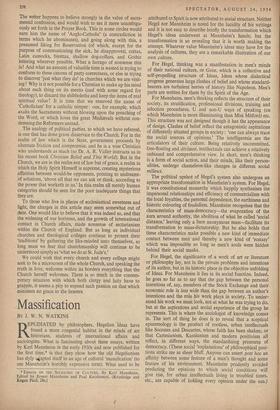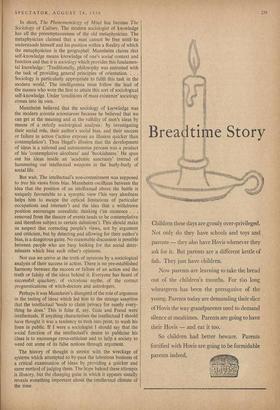Massification
BY J. W. N. WATKINS EPUDIATED by philosophers, Hegelian ideas have found a more congenial habitat in the minds of art historians, students of international affairs and sociologists. What is fascinating about these essays, written by Karl Mannheim in the early 1930s and now published for the first time,* is that they show how the old Hegelianism has slyly ;4,aptcd itself to an age of cultural `massitication' (to use Mannheim's horribly expressive term). What used to be 4' ESSAYS ON THE SOCIOLOGY OF CULTURE. By Karl Mannheim. Edited by Ernest Mannheim and Paul Kecskemeti. (Routledge and Kegan Paul, 28s.) attributed to Spirit is now attributed to social structure. Neither Hegel nor Mannheim is noted for the lucidity of his writings and it is not easy to describe briefly the transformation which Hegel's ideas underwent at Mannheim's hands; but the transformation is so revealing that it is worth making the attempt. Whatever value Mannheim's ideas may have for the analysis of cultures, they are a remarkable illustration of our own culture.
For Hegel, thinking was a manifestation in men's minds of their national culture, or Geist, which is a collective and self-propelling structure of Ideas, Ideas whose dialectical progress generates large clashes of belief and whose standard- bearers are turbulent heroes of history like Napoleon. Men's parts are written for them by the Spirit of the Age.
For Mannheim, men's thinking reflects the structure of their society, its stratification, professional divisions, training and selection procedures, U and non-U ways of speaking (on which Mannheim is more illuminating than Miss Mitford) etc. This structure was not designed though it has the appearance of design. Clashes of belief reflect the antagonistic aspirations of differently situated groups in society : 'one can always trace the social sources of opinions.' The intelligentsia are the articulators of their culture. Being relatively uncommitted, free-floating and déclassé, intellectuals can achieve a relatively unbiased and comprehensive view. In short, men's thinking is a form of social action, and their minds, like their person- alities, undergo chameleon-like changes in different social milieux.
The political upshot of Hegel's system also undergoes an appropriate transformation in Mannheim's system. For Hegel, it was constitutional monarchy which happily synthesises the impersonal relationships and efficiency of commercialism with the local loyalties, the personal dependence, the earthiness and historic colouring of feudalism. Mannheim recognises that the characteristics of mass-democracy—the evaporation of the aura around authority, the abolition of what he called 'social distance,' leaving only a bare anonymous mass—facilitate its transformation to mass-dictatorship. But he also holds that these characteristics make possible a new kind of immediate contact between men and thereby a new kind of 'ecstasy' which was impossible so long as men's souls were hidden behind their social masks.
For Hegel, the significance of a work of art or literature or philosophy lay, not in the private problems and intentions of its author, but in its historic place in the objective unfolding of Ideas. For Mannheim it lies in its social function. Indeed, he goes so far as to say that the gap between the personal intentions of, say, members of the Stock Exchange and their economic role is less wide than the gap between an author's intentions and the role his work plays in society. To under- stand his work we must look, not at what he was trying to do, but at the aspirations and social experience of the group he represents. This is where the sociologist of knowledge comes in. The sort of thing he does is to reveal that a sceptical epistemology is the product of rootless, urban intellectuals like Socrates and Descartes, whose faith has been shaken; or that Cartesianism. Kantianism and modern positivism all reflect, in different ways, the standardising pressures of democracy. (These social 'explanations' of philosophical posi- tions strike me as sheer bluff. Anyone can assert post hoc an affinity between some feature of a man's thought and some feature of his environment. Mannheim prudently avoided predicting the opinions to which social conditions will give rise, for urban intellectuals living in troubled times, etc., are capable of holding every opinion under the sun.) In short, The Phenomenology of Mind has become The Sociology of Culture. The modern sociologist of knowledge has all the presumptuousness of the old metaphysician. The metaphysician claimed that a man cannot be free until. he understands himself and his position within a Reality of which the metaphysician is the geographer. Mannheim claims that self-knowledge means knowledge of one's social context and function and that it is sociology which provides this fundamen- tal knowledge : 'Traditionally, philosophy was entrusted with the task of providing general principles of orientation. . . . Sociology is particularly appropriate to fulfil this task in the modern world.' The intelligentsia must follow the lead of the masses who were the first to attain this sort of sociological self-knowledge. Under 'conditions of mass existence' sociology comes into its own.
Mannheim believed that the sociology of knowledge was the modern scientia scientiarum because he believed that we can get at the meaning and at the validity of men's ideas by means of a strictly sociological analysis : by investigating their social role, their author's social bias, and their success or failure in action ('action exposes an illusion quicker than contemplation'). Thus Hegel's illusion that the development of ideas is a rational and autonomous process was a product of his 'contemplative aloofness' and 'bookishness.' He spun out his ideas inside an 'academic sanctuary' instead of hammering out intellectual weapons in the hurly-burly of social life. .
But wait. The intellectual's non-commitment was supposed to free his views from bias. Mannheim oscillates between the idea that the position of an intellectual above the battle is uniquely favourable to a synoptic view ('his very aloofness helps him to escape the optical limitations of particular occupations and interests') and the idea that a withdrawn position encourages unrealistic thinking ('an existence . . . removed from the theatre of events tends to be contemplative and therefore subject to certain delusions'). This should make us suspect that correcting people's views, not by argument and criticism, but by detecting and allowing for their author's bias, is a dangerous game. No reasonable discussion is possible between people who are busy looking for the social deter- minants which bias each other's opinions.
Nor can we arrive at the truth of opinions by a sociological analysis of their success in action. There is no pre-established harmony between the success or failure of an action and the truth or falsity of the ideas behind it. Everyone has heard of successful quackery, of victorious myths, of the correct prognostications of witch-doctors and astrologers.
Perhaps it was Mannheim's disregard of the role of argument in the testing of ideas which led him to the strange assertion that the intellectual 'tends to claim privacy for nearly every- thing he does.' This is false if, say, Gide and Freud were intellectuals. If anything characterises the intellectual I should have thought it was a tendency to rush into print, to wash his linen in public. If I were a sociologist I should say that the social function of the intellectual's desire to publicise his ideas is to encourage cross-criticism and to help a society to weed out some of its false notions through argument.
The history of thought is strewn with the wreckage of systems which attempted to by-pass the laborious business of a critical examination of ideas by providing a quicker and surer method of judging them. The hope behind these attempts is illusory, but the changing guise in which it appears usually reveals something important about the intellectual climate of the time.



























 Previous page
Previous page